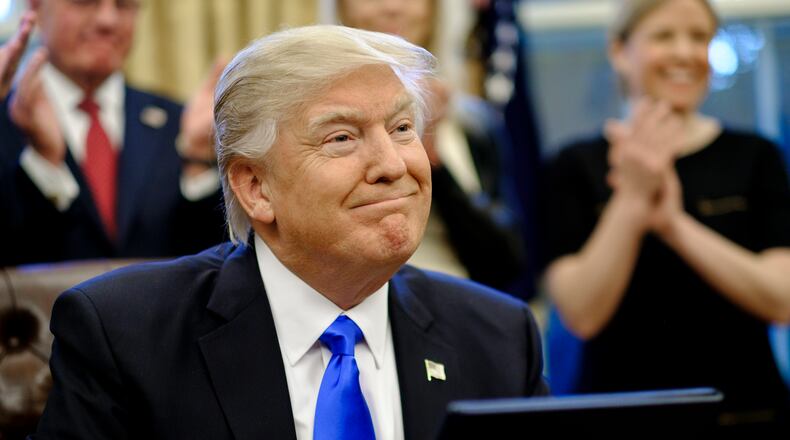UPDATE: Politico is reporting that President Donald Trump is expected to sign a new executive order on immigration Monday at the Department of Homeland Security.
The White House has not confirmed this information.
Read the original report below.
President Donald Trump plans to issue a new executive order soon after a panel of federal judges unanimously upheld a lower court's decision to suspend his immigration order amid challenges by state attorneys earlier this month.
"We will be issuing a new and very comprehensive order to protect our people," Trump said Thursday at a news conference.
He added that the order is being "tailored" to the decision made on Feb. 9 by judges in the San Francisco-based 9th U.S. Circuit Court of Appeals.
"The president intends in the near future to rescind the order and replace it with a new, substantially revised executive order to eliminate what the panel erroneously thought were constitutional concerns," the Justice Department wrote in briefs filed Thursday. "In so doing, the president will clear the way for immediately protecting the country rather than pursuing further, potentially time-consuming litigation."
A three-judge panel last week rejected arguments from the administration that the president has broad discretion over immigration policy, particularly when the policies cite national security concerns.
"Rather than present evidence to explain the need for the executive order, the government has taken the position that we must not review its decision at all," the judges wrote in their decision. "There is no precedent to support this claimed unreviewability, which runs contrary to the fundamental structure of our constitutional democracy."
>> Related: U.S. Appeals Court unanimously upholds suspension of Trump travel ban
The states at the center of the case, Washington and Minnesota, showed that they would likely suffer "irreparable harm" because of the order, which they said "unconstitutionally and illegally stranded its residents abroad, split their families, restricted their travel and damaged the state's economy and public universities," the judges determined.
The panel did not rule on the constitutionality of the ban.
Trump told reporters last week that he might sign "a brand-new order" after the judges' decision. Still, he remained adamant that the order would ultimately pass constitutional muster.
"We will win that battle," he said. "The unfortunate part is that it takes time statutorily, but we will win that battle. We also have a lot of other options, including just filing a brand-new order."
Trump signed the initial immigration order on Jan. 27. It suspended travelers from seven Muslim-majority countries for 90 days and paused the country's refugee program for 120 days. Refugees from Syria were indefinitely banned and authorities were directed to prioritize refugee applications based on applicants' religious beliefs after the 120-day period.
The order elicited protests nationwide and widespread confusion at airports, but the White House has argued that it is necessary to ensure the safety of Americans and American interests.
About the Author
The Latest
Featured


